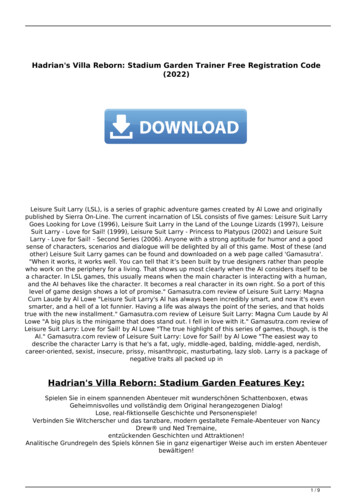
Transcription
Larry Davidson, Ph.D.Professor of PsychiatryYale University School of Medicineyaleprogramforrecoveryandcommunityhealth1
What makes for good medicine makes for good mentalhealth What makes for evidence-based medicine makes forevidence-based psychiatry What you want from your own health care is what yourpatients want from you Recovery can be a vehicle for reclaiming your field asyour patients reclaim their lives2
“The overall rate of detection of adenomas amongendoscopists who had relatively slow mean withdrawal timeswas nearly four times as great as the rate among endoscopistswho had relatively fast withdrawal times.”(6 - 12 mins.) 4 X (0 - 6 mins.)*Barclay RL, Vicari JJ, Doughty AS, Johanson JF, & Greenlaw RL:Colonoscopic withdrawal times and adenoma detection duringscreening colonoscopy. N Engl J Med, 2006, 355, 24: 2533-2541.3
Doctors whose average consultation length was less than 7minutes were less likely than those doctors who had an averageconsultation length of 9 minutes or more to recognize and dealwith long-term and psychosocial problems. Doctors who had average consultation lengths of 7.3 minuteswere less likely to enable their patients to engage in self-carethan those doctors whose average consultation length was 9.4minutes. Doctors who had longer average consultation lengths prescribedless, were more likely to include lifestyle advice and preventiveactivities, received more information, dealt with more problems,and required fewer follow-up visits.Wilson A & Childs S: The relationship between consultationlength, process and outcomes in general practice: a systematicreview. British Journal of General Practice, 2002, 52, 1012-1020.4
Physicians who had onemore malpractice claims Physicians who did not havemalpractice claims15 minor18.3 min. any*Levinson W; Roter DL; Mullooly JP; Dull VT; & Frankel RM:Physician patient communication: The relationship withmalpractice claims among primary care physicians andsurgeons. JAMA, 1997, 277:553-559.5
Practicing medicine well takes time Rushed practice leads to errors, lack of access toimportant information, inefficient and poor qualitycare, higher rates of recidivism, and more malpracticeclaims Same is probably true for psychiatry6
The term "evidence-based medicine" appearedfirst in the medical literature in 1992 in Guyatt G,Cairns J, Churchill D, et al. [‘Evidence-BasedMedicine Working Group’] "Evidence-basedmedicine. A new approach to teaching the practiceof medicine." JAMA, 1992, 268: 2420-5. The term has been defined as the integration of atleast three main elements: “best research evidencewith clinical expertise and patient values" (Sackett,2000).7
According to Sackett, BMJ, 1996, 312: 71-72: “Evidencebased medicine is not ‘cookbook’ medicine. Because itrequires a bottom up approach that integrates the bestexternal evidence with individual clinical expertiseand patients' choice, it cannot result in slavish,cookbook approaches to individual patient care.”8
At its most basic level, the recovery movementargues that people with serious mental illnesses beoffered evidence-based medicine just like everyoneelse. That, in most instances, they be treated in thesame way that all other individuals are treated. In thiscase, that they have the same freedom to choose, andright to consent to or decline any given interventionthat we might suggest.This is because the recovery movement arguesthat people with serious mental illnesses have been,are, and remain people just like everyone else, with thesame rights and responsibilities as everyone else—even that their crises should be managed like everyoneelse’s.9
Decrease stigma, discrimination, and other barriers toaccess to care Facilitate early identification and ensure timely accessto early intervention Utilize practices that are effective (i.e., that areevidence-based) Eliminate health care disparities based on race,culture, and ethnicity (2001 report)10
We know that only about 1/3 of individuals in need ofpsychiatric treatment for a serious mental illness receivepsychiatric care We know currently that ever fewer people receive effective carein a timely fashion ( 17%) We know that current interventions are limited in their efficacy(e.g., to 70% of population, to positive symptoms, etc.) We know that less than 20%, and as low as 5%, of those beingprescribed medications are receiving the most appropriate andeffective care available (i.e., evidence-based)11
About 80% of people will be rehospitalized within 5 yearsfollowing a first episode Cognitive remediation has small-to-moderate effects onneuropsychological performance, symptom severity, andcognitive functioning Supported employment is received by less than 1% ofpopulation and tends to lead to part-time employment, withjob tenure averaging 6 months, and monthly earningsaveraging only 122/month or 1,464/year ACT significantly increases housing stability and moderatelyimproves symptoms and quality of life, but also is receivedby very few people—as are most ‘evidence-based practices’(less than 5% of population)12
However, we also know that 13
Domains of functioning are only loosely linked There is a broad heterogeneity in outcome 45-65% of people with DSM-IV-TR psychosisexperience significant improvement over time,many recovering fully Unfortunately, people also will lose on the average25 years of life due to co-morbid medicalconditions and poor quality care (i.e., the longerthey live the better their chances at recovery)14
Few people ( 5%) benefit from the?few effective interventions we have,and the effects of these interventionsare only small to moderate. Yet over half will experience partialto full recovery over time, with only15-25% experiencing a deterioratingcondition.How are we to understand this?15
May need to rethink relationship of care torecovery May need to rethink role of practitioner May need to shift focus from what we can’tchange to what we can16
Recovery is not possible for my patients. Talking about“recovery” with them just builds up false hopes and iscruel. There is nothing new about recovery. We alreadypractice in a recovery-oriented way. It’s just a newname for old values.17
Let’s get concrete.Recovery-oriented care isdifferent.18
In his frequent efforts to promote the transformation agenda in Connecticut,Commissioner of Mental Health and Addiction Services, Tom Kirk, Ph.D., tells the storyof a 27 year-old man named Steve who he met during a visit to a supported housingprogram. When he asked the staff how Steve was doing in his recovery, CommissionerKirk reports that they responded favorably about how well Steve was doing in theprogram, following the rules, taking his medication as prescribed, and having hissymptoms relatively under control.When asked if this was the kind of life they hoped for this young man for the foreseeablefuture, the staff seemed puzzled, confident that they were doing their best. His condition,after all, was stable and he had not been admitted to the hospital for several years.Commissioner Kirk, however, was not satisfied. He asked the staff to go one step furtherand consider whether or not this would be the kind of life that would make them contentwere they in Steve’s place.Once it was phrased this way, the staff began to think that more could be done for, andmore could be expected from, this clever college graduate who was engaging, loved carsand racing, and had aspirations of becoming a mechanic. But how could they help himwith that? They had little idea as to what they could do beyond treating his schizophreniaand encouraging him to participate in program activities as a way of luring him awayfrom his television set. Becoming a mechanic seemed a long way off, if it was to be19possible at all.
20
People with mental illnesses may want the same thingsout of life as other people do. People are not their diagnoses, are not subsumedentirely by the illness, and continue to exist alongside ofthe illness. Mental health care has addressed illness and itssymptoms more so than the person and his or hereveryday life.21
President’s New Freedom Commission on Mental Health:Current mental health system “simply manages symptomsand accepts long-term disability” (DHHS, 2003, p. 1). “I don’t know how to find my way in the world” – Participantin “A Day in the Life” Study (Davidson, Shaw, Welborn, etal., 2010) “I had to learn how to be human again. I had to relearn howto be a dweller.” -- formerly homeless man in “A Day in theLife” “To be able to participate in person-centered care, first youhave to believe that you have the right to be a person” -- EdKnight22
The same things that help other people adapt to and livesatisfying lives in the face of other chronic illnesses ordisabilities These include:– Social support (being accepted and valued as a worthwhileand contributing person vs. patient)– Sense of personal agency and self-efficacy– Internal locus of control– Accurate and accessible information on self-care23
But to have access to these resources, people first mayhave to regain a sense of themselves as worthwhile andeffective human beings who are more than their illnesses Both because of the nature of the illness and because ofthe treatment they have received This becomes the first focus of care24
“ And then something odd happens. My awareness instantly growsfuzzy. Or wobbly. I think I am dissolving. I feel—my mind feels—like asand castle with all the sand sliding away in the receding surf Thisexperience is much harder, and weirder, to describe than extreme fear orterror Explaining what I’ve come to call ‘disorganization’ is a differentchallenge altogether. Consciousness gradually loses its coherence. One’scenter gives way. The center cannot hold. The ‘me’ becomes a haze, and thesolid center from which one experiences reality breaks up like a bad radiosignal. There is no longer a sturdy vantage point from which to look out,take things in, assess what’s happening. No core holds things together,providing the lens through which to see the world, to make judgments andcomprehend risk. Random moments of time follow one another. Sights,sounds, thoughts, and feelings don’t go together. No organizing principletakes successive moments in time and puts them together in a coherentway from which sense can be made. And it’s all taking place in slowmotion.” -- Elyn Saks, 200725
Cognitive intrusionsand disruptionsLife before illnessDecline in functioningDemoralization& despairIncreasingwithdrawal& isolationNeo-Kraepelinianmodels of illnessWays of makingsense ofintrusions &disruptionsHopeDiminished sense ofagency & increasedvulnerabilityDelusions & otheridiosyncratic ways ofmaking senseExperiences of failure,stigma & rejection26
If I can’t direct my own attention If I no longer experience my actions as stemming fromme If I can’t hold thoughts together or remember fromone minute to the next If even my thoughts seem to come from someone orsomewhere else 27
If other people act as if I am not here If other people do things to me without mypermission or consent If other people make decisions for me and aboutme without asking me If other people tell me that I’ll never get better If other people act as if I have nothing to offer If other people no longer treat me as a person 28
If other people act as if I am not here If other people do things to me without mypermission or consent If other people make decisions for me and aboutme without asking me If other people tell me that I’ll never get better If other people act as if I have nothing to offer If other people no longer treat me as a person 29
the Tinkerbell issue30
Stigma, discrimination& messages of otoContributingContributingcitizen & visible(but invisible)role modelcitizenHope, determination &encouraging support31
Relearn how to be a person (an “I”) Make sense of illness experiences and learn how to live withthem Maintain or regain a sense of belonging and personal worth Maintain or regain hope and the determination to have abetter life Have opportunities to develop and exercise an effective senseof social agency by Taking risks to reconstruct a sense of self and a safe, dignified, andmeaningful life within the limitations imposed by the disability Experiencing pleasure and success (no matter how small) “Come back normal”32
Fundamental Division of Labor: Recovery is what the person with the mental illness doesto manage his or her condition and reclaim his or her life.Recovery-oriented care is what health care providersoffer in support of the person’s own efforts towardrecovery and includes enhancing the person’s access toopportunities to learn how to manage his or her conditionand pursue “a meaningful life in the community.”33
Many existing treatments presume either: That the person has to be restored to personhood byothers before taking steps toward recovery him or herself(e.g., involuntary treatment), or That the person has remained a person and can takeresponsibility for his or her self-care and rehabilitation(e.g., skills training)Both assumptions are problematic34
Cognitive-behavioral psychotherapy assumes acollaborative relationship with the client Medication adherence requires a person to takeresponsibility for self-care Case management should be based on theperson’s ability to identify and set his or her owngoals, otherwise it is policing Cognitive remediation, like most ofrehabilitation, involves a working alliance35
“If you lose your self, then there is no one left to dobattle with the illness.” -- Pat Deegan “I had to learn how to be human again. I had to relearnhow to be a dweller.” -- formerly homeless man in “ADay in the Life” “To be able to participate in person-centered care, firstyou have to believe that you have the right to be aperson” -- Ed Knight36
First and foremost, by treating them as if they areone already (and always have been). By not perpetuating the culture and practiceswhich contributed to their losing their sense ofbeing a person to begin with. By not making decisions for them, doing things tothem, or doing things for them without asking (orat least explaining).37
By noticing the decisions they are making and the thingsthey are doing as indicators of their remainingpersonhood. By finding out where their remaining passion or interests,their sense of meaning or purpose, and their pleasureshave survived. By encouraging and supporting their sense of agency,even at the most micro of levels (e.g., getting out of bedin the morning).38
“Convalescent maniacs, when, amidst thelanguors of an inactive life, a stimulus isoffered to their natural propensity tomotion and exercise, are active, diligent,and methodical The first ray of returningtalent ought to be seized with great avidityby the governor, and tenderly fostered,with a view of favouring and acceleratingthe development of mental faculties Thereturn of convalescents to their primitivetastes, pursuits, and habits, has alwaysbeen by me considered as a happy omen oftheir final complete re-establishment. Todiscover those promising inclinations, aphysician can never be too vigilant; nor toencourage them, too studious of the meansof indulgence”.Pinel, 180139
“Peopletake for granted that youjust do things. A person with mentalillness, it’s sometimes hard it’s likeyou’re distracted, you can’t getinvolved because you’re not sort of allthere.”40
41
“I could choose to be a nobody, a nothing, and just [say]‘the hell with it, the hell with everything, I’m not going todeal with anything.’ And there times when I feel like that.And yet, I’m part of the world, I’m a human being. Andhuman beings usually kind of do things together to helpeach other out . And I want to be part of that. If you’renot part of the world, it’s pretty miserable, pretty lonely. SoI think degree of involvement is important . involvementin some kind of activity. Hopefully an activity whichbenefits somebody. [That gives me the sense that] I havesomething to offer . that’s all I’m talking about.”42
“I'm in a contest of will with the world, with nature .and I say to myself: ‘Well, damn it, you just calm downand drink your coffee.’ And I say to myself: ‘You'll justhave to wait five minutes.’ So I wait. And then theroommate's still bugging me out [but] then I have thecontrol, the self-esteem, the confidence, and it'smanageable. Then I just proudly walk to my room andtake space. I mean, it's successful.””Basically, if you know recovery it is more abouttaking control of your life and what you are going todo .”43
“there is this wicked side of me that can stop me.Just like when I’m looking for a job and see a jobthat would suit me, there is a voice that says, ‘Ah,that’s no job for you’, and stuff like that. And so Ihave to work a lot with that voice, ‘Oh, shut up, I’mgoing to apply for that job anyway’.It’s a struggle going on inside me all the time.”44
“My way is to simply see to it that I have something to do, to takea walk, light a cigarette, drink a cup of coffee, eat an apple, watchTV and be on the go. Like, I can’t just sit around or lie down andsleep all day, I can’t do that. It’s just not something I can do. Firstof all, I can’t sleep even when I take a sleeping pill. I’ve tried butI’m wide awake anyway. I feel well enough now that I want to dosomething, I want to be active, creative, have some companyaround me. I want to make something positive of the day, meetpeople, I want to talk. I’m pretty keen on having company and Idon’t just lie in bed and sleep all day I can’t understand howyou could waste your days when you only have one life. And soyou have to make something of it.”45
“Before everything was in the long term Instead, having tohang on, to find strength, I live small moments more intensely.Now we’re here, you and I, and my whole life is all here, only here.It doesn’t matter what else happens This moment here is moreimportant than anything that might happen tomorrow.This was definitely decisive for me, this fact of living intensely whatI’m doing instead of worrying about the future or other things wasa real support, a cornerstone for everything a very difficultawareness, a difficult position to take, but living intenselywhatever I’m doing, being very concentrated, for me personally Idid this and no one told me to do it. I did it on my own and itworks. For me.”46
I take it step by step. I have learned to hurry slowlyand do it in stages and set partial goals when I havediscovered that it makes sense doing it by partialgoals and making it manageable, then you get positivefeedback that it’s going okay and then you don’t hit thewall. That’s my strategy, the strategy for success: partialgoals and sensible goals and attainable goals, and that’ssomething I’ve learned to do in order to achieve things.When I have been able to deal with something that’sbeen a struggle and feel secure, I move on. Step bystep, put things behind me.”“So47
“At the bowling alley it doesn’t matter if you’re mentallyill, if you’re a foreigner, an asthmatic, a dyslexic—just aslong as you bowl as many strikes as you can you are justlike everyone else. So when I’m playing a match I’m worthjust as much as anyone else, maybe even more. In abowling match everyone’s a bowler. It’s the number ofstrikes that counts, nothing else.”48
What is worth doing today?*What does the day demand?***Heifetz, R.A. & Linsky, M. (2002). Leadership on the line. Boston: Harvard BusinessSchool Press.**Goethe49
Focus on eliciting and enhancing the person’s ownsense of control and efficacy, as only the personhim or herself can enter into, pursue, andmaintain his or her own recovery Pay particular attention to the micro-processesand micro-decisions of everyday life. This isbecause recovery is made up of the sameinnumerable small acts of living in which we allengage, such as walking a dog, playing with achild, sharing a meal with a friend, listening tomusic, or washing dishes. It is nothing more but also nothing less.50
Opening a bank account Not having to eat a hamburger alone Buying cards and presents for family and friends Making meaningful contributions to the lives of others(“giving back”) Working, learning, loving, and playing like everyoneelse51
“Mental illnesses are highly disabling, and, as recentreviews have emphasized, our science has not comeeven close to being able to cure or prevent them.Learning to live better in the face of mental illnessdoesn’t alter that reality.”-- Dickerson (2006)52
“From the perspective of the person with thedisorder, [Dickerson] has it backward. It isespecially when the illness is most severe, andbecause we do not yet have a cure, that peoplewho have these disabling disorders have nochoice but to live in the face of them. This isthe reality that takes priority in recoveryoriented care.”-- Davidson, O’Connell & Tondora (2006)53
Psychiatric care resembles medical care (i.e., at lastdisease management for chronic illness) You know what people want from you, because it iswhat you want from your own health care You can reclaim your discipline as your patientsreclaim their own lives54
In the end Here once again the memorable lips, unique and like yours.I am this groping intensity that is a soul.I have got near to happiness and have stood in the shadow of suffering.I have crossed the sea.I have known many lands; I have seen one woman and two or three men.I have loved a girl who was fair and proud, with a Spanish quietness.I have seen the city’s edge, an endless sprawl where the sun goes downtirelessly, over and over.I have relished many words.I believe deeply that this is all and that I will neither see nor accomplishnew things.I believe that my days and my nights, in their poverty and their riches, arethe equal of God’s and of all men’s.-- Jorge Luis Borges, from Fervor de Buenos Aires, 1923 (1979, p. 43)55
56
Larry Davidson, Ph.D. Professor of Psychiatry . Yale University School of Medicine . yale . program . for . recovery . . center gives way. The center cannot hold. The 'me' becomes a haze, and the solid center from which one experiences reality breaks up like a bad radio signal. There is no longer a sturdy vantage point from which to look out,










